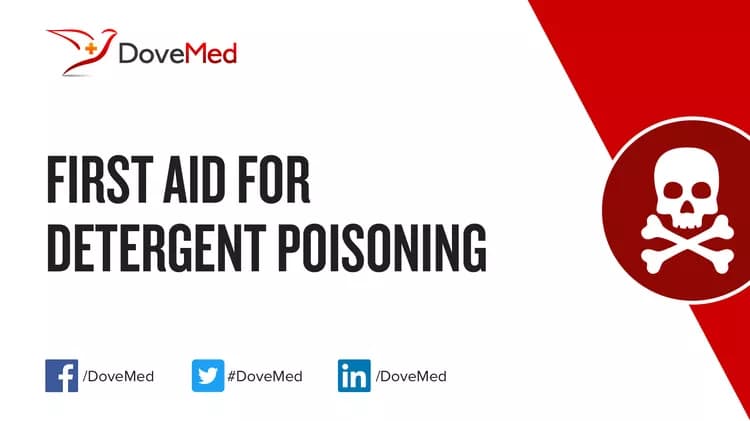What is Detergent Poisoning?
- Detergents constitute a wide range of household washing and cleaning agents used for laundry and dish. They are complex chemicals that are classified into anionic, cationic, and non-ionic detergents
- Detergent Poisoning is the accidental or intentional intake of detergent products
- The condition is diagnosed based upon the clinical history, combination of signs and symptoms, and additional tests (that may include, in some cases, radiological studies and laboratory tests)
Detergent Poisoning may be also referred to as the following:
- Detergent Toxicity
- Dish Detergent Poisoning
- Laundry Detergent Poisoning
What are the Causes of Detergent Poisoning?
- Detergent Poisoning is caused by the ingestion of detergent used for washing and cleaning purposes. The detergent may also get into one’s eyes and cause irritation and pain
- This intake could be accidental, or in some cases intentional, to bring self-harm
- Detergents may be in the form of powders, bars, or concentrated liquids that are made from a variety of chemicals. These include anionic, cationic, and non-ionic surfactants, builders and bleaching agents (such as sodium tripolyphosphate, sodium tetraborate, sodium percarbonate, etc.), enzymes, and fillers (perfumes and coloring agents). Some of these chemicals are toxic to human consumption
Note: The compound can interact with other prescribed or non-prescribed medications in the body. Such interactions may enhance the therapeutic effects of other medications being taken, resulting in undesired side effects.
What are the Signs and Symptoms of Detergent Poisoning?
The signs and symptoms of Detergent Poisoning can vary from one individual to another. It may be mild in some and severe in others. The signs and symptoms may include:
- Breathing difficulties, if the powder or fumes are inhaled. This may also affect the nose, eyes, and throat
- Fluid in the lungs (lung edema)
- Burning and associated pain in the mouth, throat, and food-pipe (even the stomach may be burnt)
- Severe gastrointestinal tract burns may result in perforation of the GI tract
- Speaking and swallowing difficulties due to swelling of tongue and throat
- Severe skin irritation and burns (perforations on the skin may be observed)
- If detergent gets in the eye, then eye irritation and pain
- Loss of vision
- Severe stomach pain
- Blood in stool and vomit
- Sudden decrease in blood pressure (hypotension)
- Collapse
- Severe changes in blood pH value affecting many parts of the body and organs
How is First Aid administered for Detergent Poisoning?
First Aid tips for Detergent Poisoning:
- Call 911 or your local emergency help number immediately, for emergency assistance
- Call the Poison Control Center at 1-800-222-1222 (or your local poison control center) for further instructions
- Provide them with information such as the compound taken, quantity and time of ingestion, age, weight and general health status of affected individual
- Confirm that the airways are protected; also, ensure breathing and the presence of pulse
- If exposure of the eye or skin has occurred, then wash thoroughly with copious amounts of water
- Unless instructed by a healthcare professional, DO NOT induce vomiting in the affected individual
- Take individual to emergency room (ER) for further treatment
- Always try to take the compound bottle/container to the ER
In case of any emergencies, the emergency medical health professional may take the following steps towards treating the condition:
- Monitor vital signs
- Medically manage symptoms and provide breathing support, if necessary
- Administration of pain medication
- Wash eyes and skin repeatedly and thoroughly (irrigation), to eliminate any remaining compound
- Surgical treatment for skin burns including removal of burnt skin
- Administer fluids by an intravenous drip line, if necessary
Who should administer First Aid for Detergent Poisoning?
First aid for Detergent Poisoning is administered by healthcare professionals.
- The individual who is affected, or someone near, should call 911 for emergency assistance (or the local emergency number)
- They should also call the poison control center at 1-800-222-1222 (or the local poison control center) and follow instructions
What is the Prognosis of Detergent Poisoning?
- The prognosis of Detergent Poisoning is dependent on the amount of substance consumed, time between consumption and treatment, severity of the symptoms, as well as general health status of the patient
- If the individual can recover from the symptoms, with appropriate medication and early support, the outcome is generally good
- Severe exposure of body organs (mouth, throat, gastrointestinal tract including stomach) to the chemical can lead to complications and irreversible damage
- Some detergents have the potential to continue causing damage to the affected region, even after exposure is ceased; deaths have been reported
In general, toxicities are common situations in the emergency departments. A majority of the cases are often not fatal, when appropriate treatment is given.
How can Detergent Poisoning be Prevented?
Detergent Poisoning can be prevented by:
- Always following instructions for usage of any household products
- DO NOT store portions of the liquid in smaller containers and leave them unattended
- Keeping cosmetics, medications, and other healthcare products out of reach of children in child-proof containers
- Being aware of basic first aid steps in case of an emergency (such as inadvertent poisoning)
What are certain Crucial Steps to be followed?
- Call 911 (or your local emergency number) for emergency assistance, if symptoms are life-threatening
- Call Poison Control Center at 1-800-222-1222 (or the local poison control center) and follow the recommend steps
- It would be helpful if the following information is readily available:
- Type, amount and time of consumption of the substance
- Age and weight of the individual
- And, the overall health status of the individual
Related Articles
Test Your Knowledge
Asked by users
Related Centers
Related Specialties
Related Physicians
Related Procedures
Related Resources
Join DoveHubs
and connect with fellow professionals


0 Comments
Please log in to post a comment.